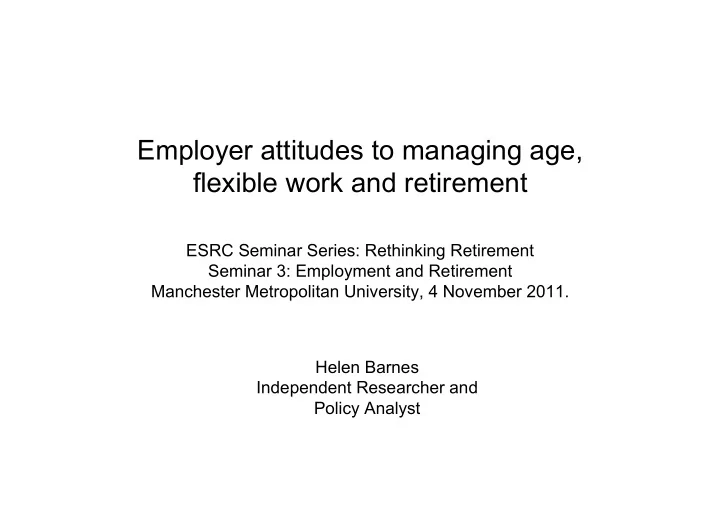

Employer attitudes to managing age, flexible work and retirement ESRC Seminar Series: Rethinking Retirement Seminar 3: Employment and Retirement Manchester Metropolitan University, 4 November 2011. Helen Barnes Independent Researcher and Policy Analyst
Presentation structure • Introduction to the research • Employer attitudes to flexible work and retirement • Rationales and influences on employer attitudes • Conclusions
About the research • Funded by the Nuffield Foundation and carried out in 2008. Aimed to: • Explore how effectively and comprehensively employers were responding to workforce ageing. • Focus on management issues and problems encountered, as well as good practice. • Gauge employer responses to the Employment Equality (Age) Regulations 2006 and proposed end of DRA. Methods: • Secondary analysis of WERS 2004 • Qualitative interviews with employers
The employer sample Size Sector Flexibility Large (10) Commercial (20) Low (10) Medium (11) Non-profit (7) Average (8) Small/Micro (13) Statutory (7) High (16)
Breakdown of employers by type of industry • Agriculture, mining and utilities (3) • Finance, real estate, other business activities (1) • Wholesale, retail and hospitality (5) • Manufacturing and construction (7) • Transport, storage and communication (4) • Education, health, and other public/personal services (14)
Factors influencing availability of pro-age policies Positively associated: Negatively associated: • Larger, unionised • Male dominated workplaces. workplaces. • Public sector. • High proportion of manual jobs and • Financial sector, workers over 50. utilities, public administration, health • Construction, and and community hotel and catering services. industry.
Flexible work – employer attitudes ‘Flexibility is normal for us’ We try to be flexible ‘We don’t do flexibility’ (when someone really needs it) (but we sometimes make an exception)
‘Deserved’ or ‘earned’ flexibility HR Manager: We wouldn’t do it I guess if I am honest to address issues of work-life balance. Researcher: What if that individual had approached you and said, you know, my elderly mother needs care? HR Manager: Very different, we’d take a much more flexible view of that. (Small, low-flexibility employer, education, health and public services)
Flexibility and age management • ‘Age blind’ approach. • Health and caring responsibilities seen as triggers for needing flexibility. • Short-term solutions rather than long-term strategies. • Reliance on employee to take the initiative. • Rationales which favour loyalty and long service. • Little reference to regulatory framework.
Flexible retirement • Limited availability of formal phased retirement schemes. • But employers often receptive to requests – entirely routine for some. • Generally viewed as immediate prelude to retirement, rather than long-term age management strategy. • Some employers have negative views.
All it means is that you've got somebody that really doesn’t want to be there, and just doing three days a week because they've got to downscale until they get to 60.… I don’t always agree that actually if you’re going to make somebody part-time it is the panacea for everything. (Line manager, Medium, medium-flexibility employer, education, health and public services)
What would probably happen, I suspect, is that, that person that’s stepped down would then be written off a bit, you know… Like “They’re out of the game now”…. Or indeed they’re going on a route that takes them out of the college. (Line manager, Large, high-flexibility employer, education, health and public services)
Influences on employer attitudes and practices • Size • Sector • Organisational culture • Age profile of workforce • Desire to contain demand for flexible practices
Discussion and conclusions • Reactive and ad hoc employer approaches limit access to flexible work and retirement options for older people. • Employers may also be less inclined to offer them in the current economic climate. • Lack of flexibility is a major barrier to extending working lives and to re-entering work, especially for older people with a health problem. • Removal of DRA and proposed universal right to request are positive, but more is needed to extend awareness/good practice.
Recommend
More recommend